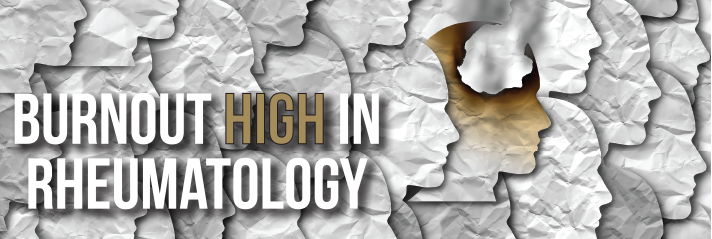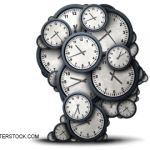
Lightspring / shutterstock.com
A new Medscape survey found that rheumatology has the second-highest burnout level among the 29 specialties included, with 50% of the rheumatology respondents saying they’re experiencing “burnout.”
To which some rheumatologists are responding: Really?
“I was quite surprised by this,” says Beth Jonas, MD, chief of the Rheumatology, Allergy and Immunology Division at the University of North Carolina School of Medicine, Chapel Hill, and chair of the ACR Committee on Rheumatology Training and Workforce Issues. She wonders about the survey’s methodology, but also says burnout is an issue that deserves attention and action.
According to Medscape, more than 12,000 Medscape physician members responded to the survey, and 1% of them were rheumatologists, meaning it included responses from about 120 rheumatologists.1
The results of the survey are especially confusing because rheumatology has been known as a specialty with “happy” physicians—even in many previous Medscape surveys. Just last year, another Medscape survey found rheumatologists were top-ranked for being happy outside the workplace, with 60% reporting being happy. This year, 79% of rheumatology respondents reported being happy outside the workplace before the COVID-19 pandemic. After the pandemic hit, only 49% said they were happy outside work.2,3
“I think there are a lot of caveats to this ‘research’—and I use that term very loosely,” Dr. Jonas says. “I think this is based on an extremely small sample. We really do not understand how burnout was defined.”
In last year’s Medscape survey on burnout, 46% of rheumatologists said they were burned out, the 8th highest percentage among specialties. In 2019, 41% of rheumatologists said they were burned out (16th), and in 2018, 38% (21st). In the 2017 survey, 54% of rheumatologists said they were burned out (6th).
“Those are basically the wiggle of the study,” rather than a true portrayal of burnout levels, says Martin Bergman, MD, a rheumatologist and clinical professor of medicine at Drexel University College of Medicine, Philadelphia, who has researched burnout among rheumatologists. “There’s no intellectual reason why that would happen over a five-year period.”
In the survey, the biggest contributor to burnout identified by all the respondents across all specialties was “too many bureaucratic tasks”—58% gave that answer—followed by spending too many hours at work and lack of respect from administrators and colleagues, both at 37%.
In the comments published along with the Medscape survey, some physicians wondered about how respondents understood the term “burnout.”
“I’m not sure if the respondents really understood what burnout is,” one commenter wrote. “That a third said it didn’t affect their lives tells me they are not burned out. Burned out means you are barely able to hold on, and each day has to be personally negotiated as to whether you carry on.”
Many commenters took the opportunity to express their own reasons for feeling overwhelmed at work, such as patient load and the demands of the electronic health record system.
Behind the Burnout
While Dr. Jonas questions the rigor of the survey, she says many real reasons explain why rheumatologists may feel increasingly burned out. Many rheumatologists went into the specialty because of the connection they’re able to make with patients, and those relationships have been interrupted during the COVID-19 pandemic. This connection is “hugely important,” she says.
Reflecting on her own practice, Dr. Jonas says she was happy to get basic care to patients in the early days of the pandemic by way of telehealth, but as time wore on, she knew more thorough care was needed and she craved those deeper connections.
“People need to come in for their infusions and need to have their bone density measured,” she says. “We need to get their laboratory tests done. So the longer this goes on, the more challenging it becomes. We feel like we’re missing aspects of people’s care.”
Dr. Jonas had patients who traveled to be with family for safety. But before the rules regulating telehealth were eased during the public health emergency, she couldn’t do a telehealth visit with them—and “this is somebody I’ve known for 10 years.”
Rheumatologists, Dr. Jonas says, have felt “at least some sense that we’re not absolutely doing the best job for our patients,” adding, “You do the best that you can under the circumstances, but it’s not the best.”
Work-life balance may also have gotten thrown off kilter during the pandemic, especially for women physicians who have taken on a disproportionate amount of the additional child-rearing and home-schooling responsibilities that have arisen during the outbreak.
With physicians working from home offices, Dr. Jonas says, “there’s a blurrier line between what’s work and what’s home. I think many of us are spending more time in our home offices than we would have spent in our work offices.”
The burdens of step therapy and obtaining prior authorizations—issues for which the ACR and other physician groups are pushing for legislative solutions—have also continued to weigh on rheumatologists.
Whether these things impacted the survey results, she isn’t sure, says Dr. Jonas. “I think it’s hard to square it all. I think we don’t have enough information to really know how to interpret the data.”
Other Results
A survey-based study led by Dr. Bergman, conducted at a conference and published in 2020, found that 51% of participants demonstrated burnout according to the Maslach Burnout Inventory—and “this conference was in Maui,” Dr. Bergman says.
“The numbers were shocking,” says Dr. Bergman. The biggest correlations were dissatisfaction with the electronic health record, lack of exercise and working more than 60 hours a week.
Although he is quite happy in his job, he says, a lack of autonomy can intrude on the physician-patient dynamic, leading to frustration. That’s particularly true with step therapy and prior authorization. “I can have a discussion with a patient,” Dr. Bergman says. “The patient and I can choose what we feel to be the best, most effective and, usually, the safest treatment option, and I’m then told by an insurance company that I can’t use that therapy.”
Dr. Bergman can’t say with confidence how much the COVID-19 pandemic has contributed to feelings of burnout, but says it’s easy to see how the pandemic could reduce satisfaction, particularly among rheumatologists.
“Rheumatology by design is a hands-on specialty,” Dr. Bergman says. “There’s only so much we get from labs and history. We get a lot. But at some point you need to actually touch a patient. I have found it very difficult. Again, speaking personally, I did not find telemedicine to be as satisfying.”
Part of the reason more physicians are reporting they’re feeling burnout could be that the term burnout is trending, says Dr. Bergman, but, he continues, “maybe there’s more awareness.”
Both Dr. Bergman and Dr. Jonas say that no matter what a Medscape survey says and no matter the level of scientific rigor of the survey, burnout is a problem and needs attention. Burnout has real consequences—not just for physicians, but also for patients, according to Dr. Bergman.
“The quality of the medicine drops. If I’m not into it, what am I going to do? I’m going to rush through the patient encounter,” Dr. Bergman says. “If I’m frustrated and I know it’s a hassle, I may not go to that next level of therapy the patient should be getting, because I just don’t feel like going through the headache of trying to get it approved.”
The surveys conducted by Medscape and Dr. Bergman serve to help providers and practices recognize the challenges and figure out ways to mitigate those challenges to prevent burnout, concludes Dr. Jonas.
Thomas Collins is a freelance medical writer based in Florida.
References
- Kane L. ‘Death by 1000 cuts’: Medscape National Physician Burnout & Suicide Report 2021.
- Martin K. Medscape Physician Lifestyle & Happiness Report 2020: The generational divide.
- Martin K, Koval M. Medscape Rheumatologist Lifestyle, Happiness & Burnout Report 2021.
- Tiwari V, Kavanaugh A, Martin G, Bergman M. High burden of burnout on rheumatology practitioners. J Rheumatol. 2020 Dec 1;
47(12):1831–1834.



